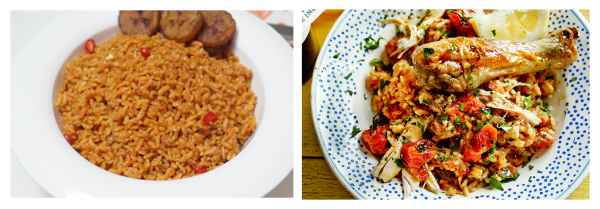
Traditional Jollof Vs Jamie Oliver’s Jollof
Jamie Oliver cooked Jollof Rice and the West African internet community reacted in a way that shocked the world. For those who do not know; Jollof is a religion, it’s a dish so sacred it should have a national holiday.
I am a proud devotee of Jollofnation, so much so that I take offense when people try to tell me I eat too much Jollof. It is not surprising that everyone expected me to have a similar reaction to that of the thousands of people talking about this issue, I am sorry to disappoint everyone but I am of a different viewpoint and here is why:
As a food blogger, I am very familiar with the attack that comes with recipes and even presentations that are deemed non traditional, I have been personally attacked so many times it is now comical. I was told recently that a particular soup I prepared wasn’t right because it wasn’t “Green enough” even though all the expected ingredients were used.
Let us assess the biggest complaint of Jamie’s Jollof :
Jamie’s Jollof is not authentic because he made use of “Weird Ingredients”
He never claimed that his recipe was authentic or traditional , he clearly stated that the recipe is his interpretation . His post stated ” Jamie has taken all these variations to heart and come up with his own kind of rice. It’s got lots of European twists in it to make it his own”
what constitutes an authentic Jollof recipe anyway?
There are lots of variations even within West Africa. I know some Nigerians that will not be caught dead with Ginger in their Jollof and most Ghanians that I know will never cook Jollof without it. There are even debates on the type of rice to use, some think it should be scented long grain rice while others think parboiled rice work best.
To put things in perspective, here are some unique variations from popular West African Food Blogs:
1QFoodPlatter: Uses thyme but not curry and frys the rice before adding stock / water
Afrolems: uses Bay leaves and Garlic in her recipe
Dooney’s Kicthen : Uses Olive oil in her version
Lohi’s Creations : Uses allspice in her version
Betumi Blog: Uses fresh grated ginger and black/white pepper in her recipe
9jafoodie: uses Basmati rice and tomato paste (puree)
I ask again, who is to decide what constitute an authentic Jollof rice recipe?
The common thread in all these recipes is Maggi , I will bet a million dollars that the Wolof people that created the recipe thousands of years ago did not have Maggi, this means that recipes evolve over time and things are added and removed as it passes from generation to generation.
The so called weird ingredients in Jamie’s Jollof:
– Cherry tomatoes: I know a lot of great Nigerian cooks who add fresh tomatoes and onions to Jollof after it’s cooked. I think the cherry tomatoes serve the same purpose
– Coriander and flat leaf parsley : These are flavor enhancers which I think will work great in Jollof especially when Thyme isn’t used
– Vine-ripe tomatoes, chopped : This is a traditional ingredient found in all the jollof recipe from the websites listed, the fact that this was chopped not pureed makes absolutely no difference to the dish
– 1 lemon, cut into wedges : The key here is ” to Serve”, which means optional to use. The man did not add lemon into the rice biko
Some have argued that Jamie’s interpretation of Jollof is a great example of cultural appropriation, that his dish might come to be the international expectation for what Jollof is supposed to entail. This notion might come from a good place and I am all for preserving our heritage, but, the thought that one chef’s interpretation of a dish as grand as Jollof will wipe out the history and pride behind it is ludicrous.
What do you think about this issue? Is this even an issue?
In Jollof solidarity forever!!
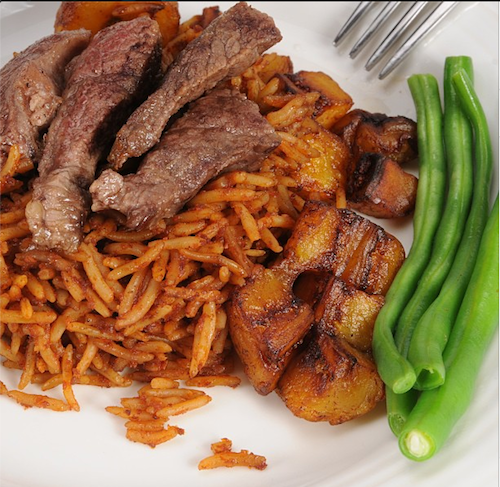
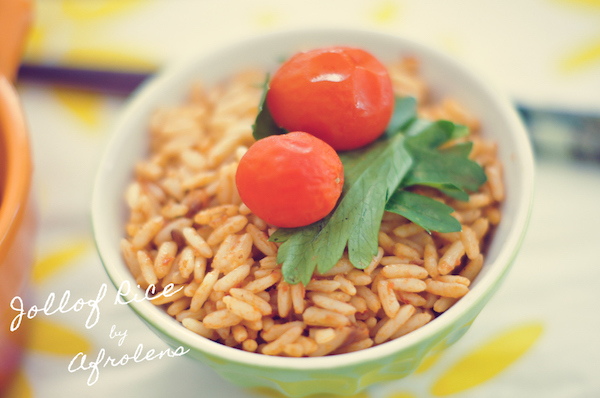
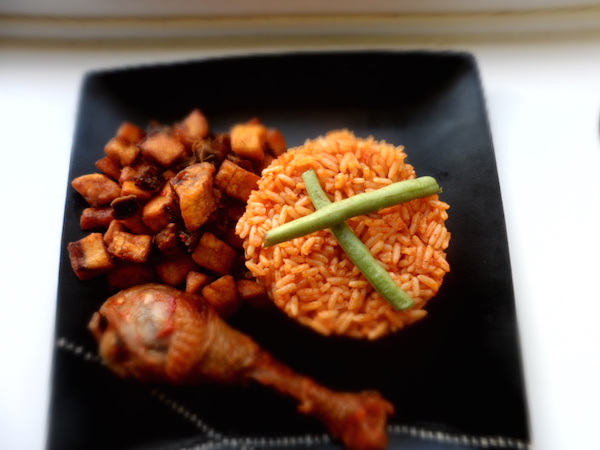
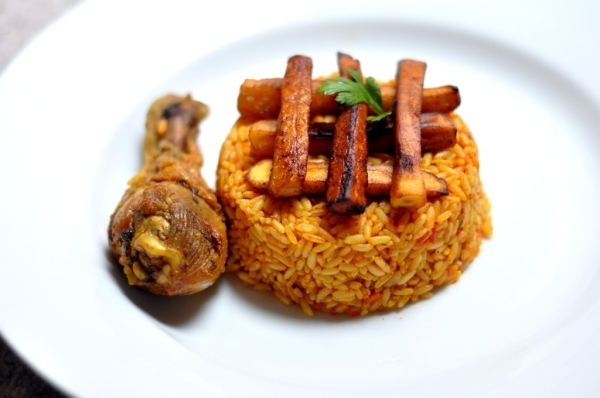
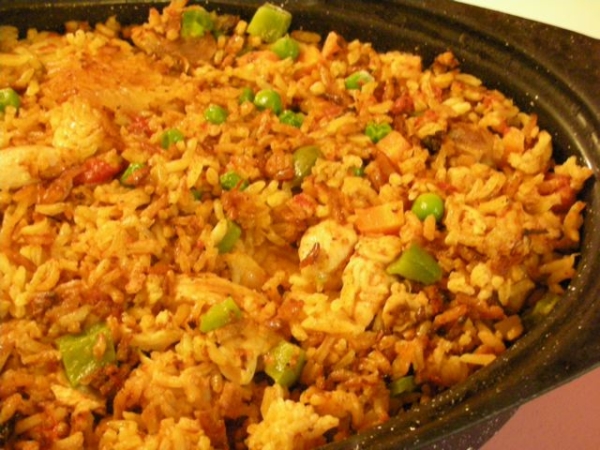
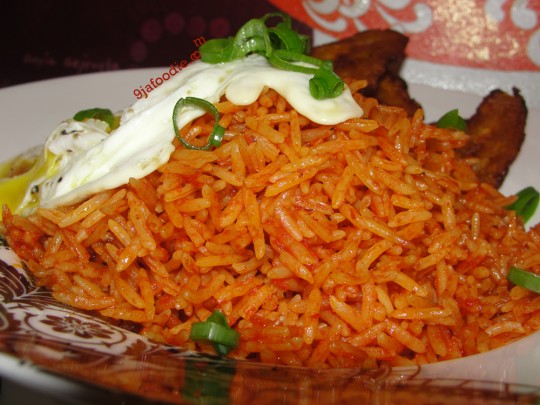
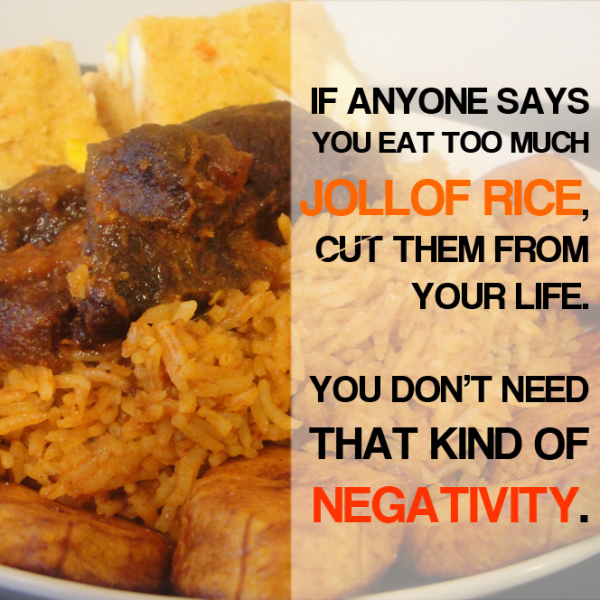

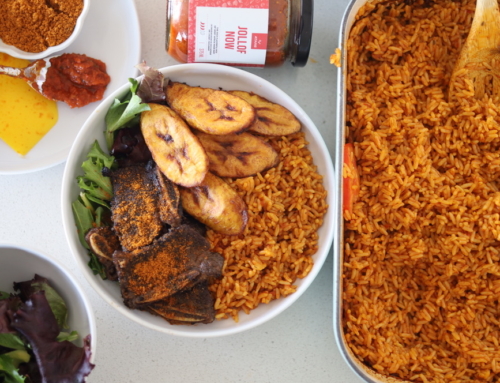


Kai we can quarrel sha! I believe that once there is rice and tomatoes, everything else is subject to interpretation. The truth is we all cook according to our taste buds, for example I do not use maggi in my food except I am looking for other Nigerians and I use only real sea salt in really small quantities and cook happily without pepper. But that’s me! I can understand the issue of someone else telling our story but if you are a cook who loves cooking you would know that you rarely follow any recipe hook line and sinker. You would always tinker with it to suit your tastebuds. Jamie Oliver is European so …. Its not the white man’s fault that we have never figured out how to document or tell our own stories consistently!!
Nice post. the article is informative. Jollof rice is one of the most African best food. Thanks
A point to be considered here is the fact is that our culture is “always” stolen when others discover how to copy it. I get troubled when we defend this just because “we” start smelling ourselves like we have “made it” or something. People want their own and would appreciate others who are willing to recognize their creations as theirs. So I empathize with others who don’t want their creations to be reinvented by those with the power of the media which will ultimately dictate where this obviously gorgeous dish originated.
I zoomed jamies jollof upclose and I saw the jollof rice underneath all the garnishings.. I must say he was right about calling it jollof rice, infact I would choose his own jollof anytime anyday over our own conventional rice.. He was really creative about it, and that alone can help one’s appetite assuming you don’t feel like eating..
God bless the person who also disagrees with your opinion of Jamie’s jollof vegetable rice. Every1 has an opinion
People are just myopic in their thinking and you can actually tell people that love the food & culinary industry vs those that have no clue. I’ve seen and tasted different version of jollof rice and its the presentation that matters most. I use basmati rice sometimes when I want something different. I don’t understand how people can eat the same thing everytime. The chinese food they sell around is NOT original chinese food that is why you never see an original chinese person eating in PF Changs, it has been adapted to the palettes and taste buds of the intercontinental man. If this is how Nigerian food or west african food will make it to international level, am all in favour of it. They just gave Jamie and Maggie good PR publicity for FREE!!
My 2 cents
Bless you!!
This is so refreshing! I didn’t understand the vitriol directed at poor Jamie. It’s not like he said he invented jollof. In fact, I liked the fact that he featured West African food. Our food is usually never considered interesting or sophisticated enough to “cross over”. Not that I care about crossing over, but I love to see foreigners enjoy the many good things about our culture, including food. And food is always subject to interpretation, that is why we have so many delicious cuisines. Otherwise, we might as well all be eating the same food our caveman ancestors ate to survive…oh wait, it’s called the Paleo diet.
Anyway, Jamie’s jollof interpretation beats all the negative news any day. There is more to us than Boko Haram and Ebola.
Very well said
Abeg my friend, all this grammar na waste of time. Tell the man to leave our Jollof rice alone if he cannot cook it with respect. Lemon and Jollof simply don’t belong on the same plate; that is a universal law; and don’t even get me started on the state of the chicken!
And where was the rice sef on that plate ehn? Mtcheeeeeeeeeeew!
LOL awesome comment. Nothing do you. Continue de chop your suffer rice “Enigma”.
Isn’t there bigger problems in this world to be worrying about ? Who ever when ever can cook what ever how ever they want … Not ever dish is going to be the same . Every time I go to a Nigerian event with my partner all the food I eat is prepared slightly different in some ways …
indeed
Is he even “guilty” of garnishing it with chopped herbs? I take cooking very seriously and I think it’s diverse, I think it varies from person to person…my idea of jollof may not be your idea of jollof that is because we cook to our own taste, or accordinng to how we were taught. For example, Nigerian idea of noodles is totally different from an Asians’ , same goes for spring roll and samosa and how we’ve changed it to best suit our taste buds. His rice is red and it tastes nice..(I believe) so who’s to say it’s not jollof? The Bible’s idea of cake isn’t our modern day idea of cake..are we to say we aren’t baking it the right way? My mum cooks her okra soup with mushrooms all the time…she adds peas to her beans…so in my opinion, provided the key ingredients are in the dish, then it is what it is…we should be embracing new methods other than putting them off.
My point exactly Jemima…. thank you!!
I was shocked that he thinks his veggie rice is the right one. First he can cook some food and is a prominent cook, but it’s not impudent to say like is false cooked, but lot of generations prepare this kind of food; give his family receipt from mother to daughter? This about a Maggie cube?
Cooking is free interpret by style people like to eat.
Example, no Africans want to teach him, how he have to cook BRITISH PLUMPUDDI !! !!!NO.
Well he did not use vegetable in his recipe, all he is guilty of is garnishing his dish with chopped herbs. And are we seriously upset he didn’t use maggi cube? when did maggi become an authentic ingredient in traditional African food?
I see some people are missing the point,no one is critizing his effort but what is effort is trying to represent like.
I would try his version of….(gosh can’t even end it
..well)version of jamie oliver twist (I refuse to downgrade jollof rice) but I would never ever call that a jollof rice… Like someone sed where the heck is the rice in this dish.
Jamie you went too far!!!!!
trying to represent what exactly?
Agreed, it would be boring for Jamie Oliver to prepare the basic Jollof Rice. He must put his own spin on it but he should have called his Jollof Vegetables not Jollof Rice. lol
But he didn’t even use any vegetable in his dish though….
I definitely don’t think it’s an issue. Like seriously, what’s our own sef…when I saw Jamie’s article, I thot it was a unique take on jollof…that’s all. I think it’s wrong to criticize people’s effort the way we tend to do a lot. Nice article.
very well said!
I do not take offense to his interruption but I see why others do. The point that his version will be the new identity for what Jollof should be is not very far fetched. Anything that the western world remakes somehow seem to take the place of the original, history has taught us that. (I can’t think of a good example at the moment but if I do I will come back and post it). My point is the west has a way of making Third world countries traditions and ideas less appealing when they do their own interpretation. He could have chosen to respect the importance of the dish and not modify it so drastically but he chose otherwise. Anyway shrugs.
I think the loss of appeal in most situations is more of our problem than that of the people that adopt our culture. Chinese food has been westernized in order to broaden its reach and commercialize, these has only lead to increase in food tourism to Asia. There is no reason why our story has to be different.
Aunty, @Temi said it best. Wetin bring me come this old post? I was looking for your Jollof recipe and I wanted to shower thanks ni. But @Temi is right and so far… Don’t take this the wrong way, you have been applauding everyone with your similar opinion and pressing for more with others who offer a differing opinion. Basically, your bias is showing.
Appropriation is real. And the westernized Chinese food you are taking about is westernized by the Chinese themselves, not by white Americans. There is a difference in WHO is giving the identity and who is changing the identity.
Please at least the other recipes look similar! How is Jamie’s very jellof?!
Again….are we upset about the recipe itself or the plating of the food?
One day we as a people would learn to be respectful of people’s creativity and applaud efforts. Great article
Very well said :)
Where is the like button?
I make my jollof rice spiced with cumin, garlic and bay leaves. I never use Maggi cube and I always put a lot of vegetables in it. I agree with you, it’s just an interpretation by Jamie and I really have no qualms with it. By the way, cumin adds fantastic flavour to jollof rice.
Thanks for sharing! I will try cumin in my next jollof.
9ja foodie! Haba! I can’t even see the rice in jamie’s dish. No wonder the uproar. He should just have labelled it jollof styled rice with vegetables because he truly murdered the food. Jollof rice is made with rice and tomatoes and an other spice and seasoning you want. But the vegetables are served as a side dish not the main dish. The only vegetables permitted in d dish a probably thinly sliced tomatoes, a few peas or diced carrots and they never obscure the beauty of the ‘ jollof rice’. They are like makeup. Abeg jamies rice looks like ‘ojuju’ #lol
So we are mad about the presentation then not the recipe itself? because his plate of food is obviously Jollof garnished with chicken strips and chopped herbs. Are we upset that he didn’t serve these things on the side?
Well I don’t think its an issue how you cook Jollof rice or any food for that matter. At the end of the day how you prep your food is based on your cultural interpretation of the food and also based on the peculiar palate of your culture.
Let me cite some examples:
Nigerian Sharwama is different from Lebanese or UAE Sharwama. I totally understood when I ate these other 2 wraps that they prepped it based on their local flavours. Did I complain?……….Nope.
Example 2, the way Igbos prep Okoro soup differs from how Yorubas prep the the same Okoro soup. Never hear any hullabaloo about it.
Jollof rice to me constitutes two main ingredients Rice and Tomatoes cooked together. Once any of the 2 is missing it’s not Jollof. What ever ingredient you add in addition to the rice and tomatoes is at your personal discretion, it still remains Jollof.
BTW, I’m more a beans person than a rice person……..Lol.
Very well said. He used all the main ingredients required for the dish, the fact that he didn’t use maggi or curry does not take away from the jollof.